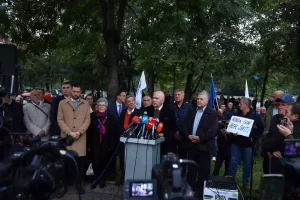High Representative

| 23 August 2022 -12 Sarajevo, Bosnia and Herzegovina ANNOUNCEMENT OF “CIRCLE 99” (“KRUG 99”) in response to public remarks by the High Representative The centuries-long aspirations of the Bosnian body politic, having utilized a historic opportunity through anti-fascism to restore statehood, the resolute decision through the referendum for state independence and orientation to the modern Western values of liberal democracy, in spite of all the Scyllas and Charybdises and sacrifices – cannot and will not be extinguished! This is the first lesson that every international actor must learn before deciding, even with good intentions, to become involved with the Bosnian post-genocide drama, with the real factors and firm foundations for peace and stability. These are certainly not found in the reaffirmation of hegemonic and ethno-territorial predatory models and the undemocratic formulations that undermine the sovereignty of the state and destroy the undeniable and unquenchable will of the people, equality, political rights and freedoms of every individual, every citizen of a democratic state and society. It appears that High Representative Christian Schmidt, and those whose policy he is supporting, is making a cardinal error in his basic approach to Bosnia and Herzegovina calling it a country which “consists of three nations that decide for themselves.” This is the destructive approach of every ethnic nationalist, whether in Bosnia or in Ukraine. For this reason, Circle 99, along with democratic public opinion in Bosnia and Herzegovina, is distressed by the recent public remarks of High Representative Christian Schmidt. He said he is only studying the Constitution of Bosnia and Herzegovina. Nevertheless, it is dangerous to attempt to exceed the authorities accorded the High Representative as they are delineated in Annex 10 of the General Framework Agreement for Peace in Bosnia and Herzegovina. It is true that every High Representative, whoever he might be, is the final and determining interpreter of the civilian aspect of the Dayton Peace Agreement. But this does not encompass the Constitution of Bosnia and Herzegovina, which is interpreted solely and exclusively by the Constitutional Court of Bosnia and Herzegovina as the defender of constitutionality in this country. In fact, the decisions of any court, including the Constitutional Court of Bosnia and Herzegovina, are not a part of the civilian dimension that Mr. Schmidt is trying to interpret. Even less understandable to the wider public is why Mr. Schmidt persistently emphasizes only the “Ljubic” case decision of the Constitutional Court of Bosnia and Herzegovina. This decision does not in any way deal with the entity constitutions, in which he [Schmidt] wants to intervene in spite of his lack of authority, unless it is in instances where specific provisions of the entity constitutions are not in harmony with the Constitution of Bosnia and Herzegovina. And even that can only be done when it is so confirmed by the Constitutional Court of Bosnia and Herzegovina, as was the case in 2002. It is obvious why he is concerned only with this particular decision, even though eminent experts of constitutional law, and even the Constitutional Court of Bosnia and Herzegovina itself, made it clear that this case has been finalized given the elimination of contentious provisions of the Electoral Law of Bosnia and Herzegovina. Meanwhile, the only remaining decision of the Constitutional Court of Bosnia and Herzegovina where sections of entity constitutions were declared unconstitutional was the “Komsic” case of 2015, which evidently is not of concern to the High Representative. It seems that the predetermined plan is – contrary to his authorities – to engage only with those legal elements that maintain and even strengthen ethnic politics and institutional divisions. Among critical assessments is the opinion of the Venice Commission concerning the “Ljubic” case of 2016 as stated to the Constitutional court of Bosnia and Herzegovina as an ‘amicus curiae’ (friend of the court): “After an exhaustive analysis of the case in question, the Venice Commission has determined that, first of all, the principle of the equal right to vote is guaranteed by Article 25 of the International Pact, as well as by Article 3 of Protocol No. 1 of the European Convention. Inequality in the representation of electoral units is, in principle, prohibited, even if there is a certain field of assessment.” It is dangerous for Schmidt to accept the hegemonic and paternalistic ideological narrative of neighboring countries that in Bosnia and Herzegovina “it’s not a matter of majority and minority, but rather it’s about a country that has three groups or three constituent peoples.” This is because this runs counter to the political and especially the democratic electoral process and Parliamentary activity, where it is always a matter of a majority and a minority, as an expression of democracy that should be applied in Bosnia and Herzegovina. The above mentioned statement only reflects the interests of separatist actors who claim that in Bosnia and Herzegovina democratic standards, or the principles of democratic standards, cannot be implemented. This especially ignores the results of two censuses conducted in 1991 and 2013, showing that Bosnia and Herzegovina is home to not three but twenty or so ethnic groups, which are referred to with the discriminatory and unwieldly term “others.” Even more important, the population census is not a census of political preferences. Rather, it is a registering of various statistical facts and figures, not of identifying factors such as religion, gender, ethnicity and other individual self-identifications. For this reason, this has been decided and finalized already in five cases that came before the European Court of Human Rights, along with two additional current cases, all resulting in clear guidelines to this country about how to overcome systemic discrimination, inequality of citizens, or, more accurately, how to enter into the club of modern democratic countries. For this reason, we call upon the High Representative to explain clearly what he meant or to whom he was referring when he used the term “rubbish.” Was it those political actors who advocate a society of equal citizens, or those who wish to maintain discrimination through ethnic politics? We will not get into the fundamental motives of those who, through their media and political statements, denigrate the growing strength of civic society and a civic structure of governance. It is enough to point out that in this way they are strengthening the forces of ethnic nationalism and the supporters of retrograde ideas about “the legitimate representatives of a people,” which cedes the sovereignty of Bosnia and Herzegovina to neighboring states – to Serbia and Croatia. This is the thought behind the supposed agreement or “relaxation of relations between Bosnjaks and Croats” as an expression of the Washington Agreement, which implicitly calls for the formation of a confederation with neighboring Croatia. Do supporters of this favor the disappearance of Bosnia and Herzegovina and the creation of a union with neighboring Croatia on a confederal basis? The Washington Agreement was superseded by the signing of the Dayton Accords. Any illusory return to the Washington Agreement would erect another barrier to the evolution of a democratic political system in Bosnia and Herzegovina and would further distance the country from integration with the EU and NATO. If the political system in Bosnia and Herzegovina is to really evolve in such a way as to adopt basic democratic standards, then this country should be a state of equal citizens and not one of – to use the old mantra – “citizens and peoples.” We are witness to the failure of this approach for at least the past 30 years. This mantra about a country of “equal citizens and peoples” is obsolete and very dangerous. It is neither a European standard nor an expression of modern democratic values. Rather, through an elusive balancing of civic and ethnic concepts, it obviously represents a concession to ethnic politics, which attempts to divide the country in an ethnic-territorial manner (federalism) leading to its ultimate dissolution. Those supporting this thesis should realize that the bearers of the sovereignty of every democratic state are its citizens. That is who they are also in a modern, democratic and prosperous Bosnia and Herzegovina. Without this, there is no membership in the EU or NATO. Adil Kulenović, President |
| Association of Independent Intellectuals – Circle 99 (Bosnian: Krug 99), a leading Bosnian think-tank, was established in Sarajevo in 1993, in the midst of the Bosnian war (1992-1995), while the capital was under siege. Circle 99 provides a platform to bring together intellectuals of various professional and ethnic identities; university professors, members of the Academy of Sciences and Arts of Bosnia and Herzegovina, artists, journalists, entrepreneurs, diplomats, and other prominent figures from Bosnia and from abroad. Multidisciplinary discussions and initiatives are held each Sunday throughout the academic year, in the form of regular sessions about politics, science, education, culture, economy, and other societal issues. The overall goal is to sensitize the public towards a democratic transformation, achieving and maintaining peace, and integration of modern Bosnia into the community of countries fostering liberal democracy. Circle 99 has been declared an organization of special significance for the city of Sarajevo. |







